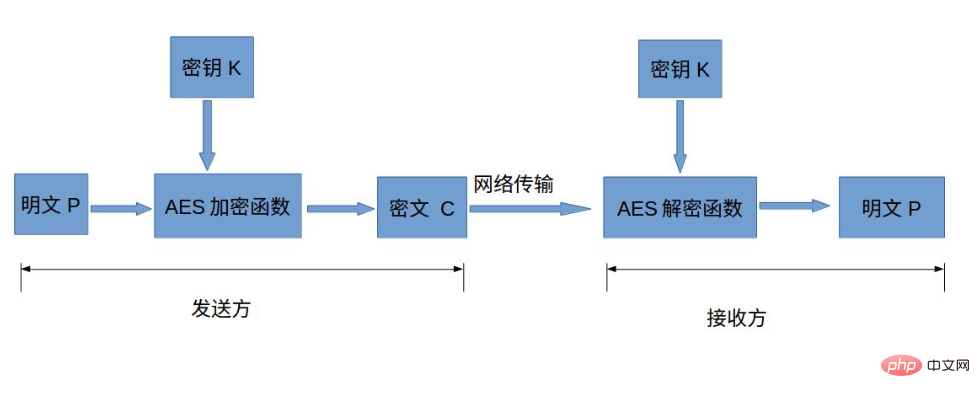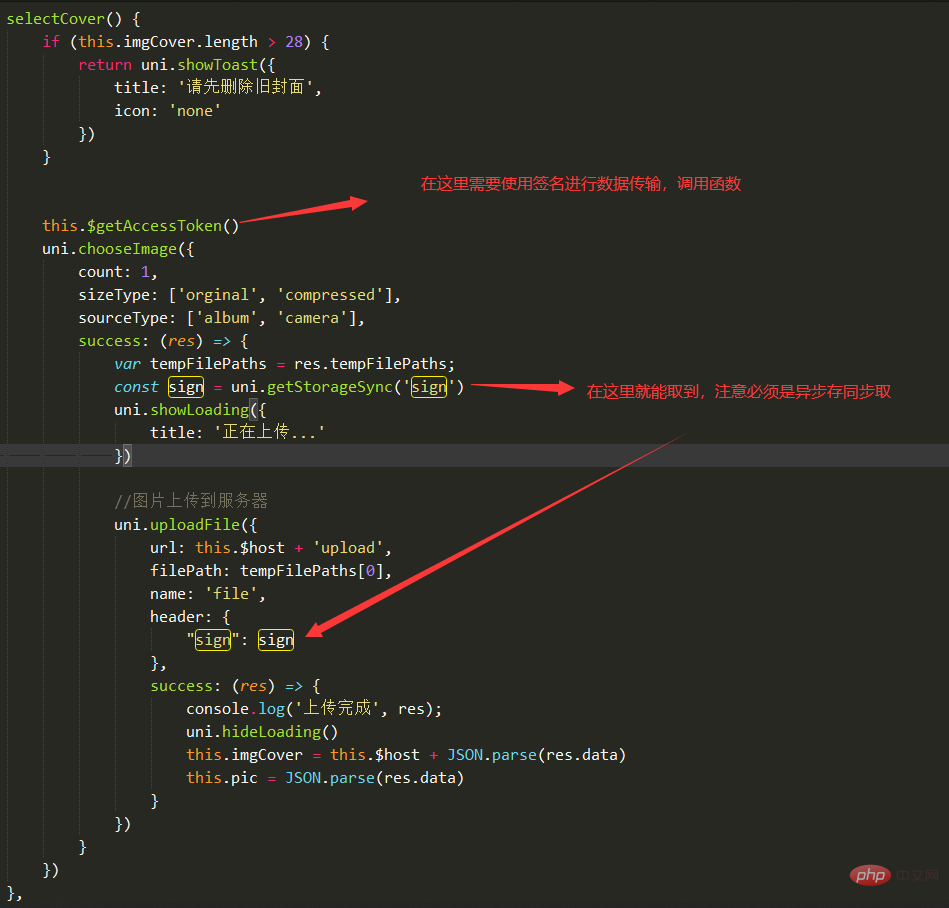Home >Web Front-end >JS Tutorial >Front-end Crypto.jsAES encryption, PHP openssl_decrypt() decryption for secure data transmission
Front-end Crypto.jsAES encryption, PHP openssl_decrypt() decryption for secure data transmission
- 灭绝师太Original
- 2021-08-31 11:04:164945browse
In the first few days, I did the development of WeChat Mini Program. For projects that separated front and back -end, if there are more sensitive data involved, we generally use the front and back end to interface encryption processing. The encryption algorithm library crypto-js is used for data encryption, and the backend uses PHP openssl_decrypt() to decrypt data for secure transmission~
Advanced Encryption Standard (AES, Advanced Encryption Standard) is the most common symmetric encryption algorithm (WeChat The encrypted transmission of the mini program uses this encryption algorithm). The symmetric encryption algorithm means that the same key is used for encryption and decryption. The specific encryption process is as follows: The encryption algorithm class library makes it very convenient to perform the encryption and decryption operations it supports on the front end. The algorithms currently supported by crypto-js are: MD5, SHA-1, SHA-256, AES, Rabbit, MARC4, HMAC, HMAC-MD5, HMAC-SHA1, HMAC-SHA256, PBKDF2. Commonly used encryption methods include MD5 and AES.
 Crypto-JS installation method
Crypto-JS installation method
# After the installation is successful, directly find the Crypto-JS.JS file, and introduce it to const cryptojs = reques ('. /crypto-js.js'); uniapp app development front-end and back-end separation api interface security policy
npm install crypto-jsThen register the encapsulated getAccessToken function on the vue prototype
Then just call the method directly in the method you need to use, as shown in the figure:

Backend tp6 creates an intermediate controller Common.php, allowing all controllers except generating tokens to integrate this intermediate controller and detect the validity of the signature in real time
 common.php code is as follows:
common.php code is as follows:
const CryptoJS = require('./crypto-js.js'); //引用AES源码js
const BASE_URL = "http://love.ouyangke.net/"
const key = CryptoJS.enc.Utf8.parse("chloefuckityoall"); //十六位十六进制数作为密钥
const iv = CryptoJS.enc.Utf8.parse('9311019310287172'); //十六位十六进制数作为非空的初始化向量
export const getAccessToken = ()=> {
uni.request({
url: BASE_URL + 'getAccessToken',
method: 'GET',
success: (res) => {
// console.log(res);
const {
data
} = res
if (data.code == 0) {
return
}
// console.log(data.token);
var encrypted = CryptoJS.AES.encrypt(JSON.stringify({
token: data.token,
create_time: data.create_time
}), key, {
mode: CryptoJS.mode.CBC,
padding: CryptoJS.pad.Pkcs7,
iv: iv
}).toString()
// console.log('签名完成',encrypted );
// 记录在本地
uni.setStorage({
key:"sign",
data:encrypted
});
},
fail: (err) => {
console.log(JSON.stringify(err));
}
})
}ApiAuth.php
<?php
namespace app\love\controller;
use app\BaseController;
use think\facade\Cache;
use lib\ApiAuth;
class Common extends BaseController
{
const ILLEGAL_SIGN = 'sign is illegal';
public function initialize()
{
$this->checkRequestAuth();
}
//验证方法
/**
* 检验sign的真实性
* @return bool 校验通过返回true,失败返回false
*
* 检查app每一次提交的数据是否合法
*/
public function checkRequestAuth()
{
//获取header头的某个信息sign
$sign = request()->header('sign');
$res = ApiAuth::checkSign($sign);
if(!$res)
{
echo json_encode(['status'=>0,'msg'=>self::ILLEGAL_SIGN]);
exit;
}
}
}Aes.php:
<?php
namespace lib;
use think\facade\Cache;
//校验类
class ApiAuth
{
// 生成签名
public static function setSign(Array $data=[])
{
ksort($data);
$sign_str = http_build_query($data);
return (new Aes())->encrypt($sign_str);
}
// 校验sign
public static function checkSign($sign)
{
// 解密sign 获取到的明文信息
$str = (new Aes())->decrypt($sign);
if(!$str)
{
return false;
}
$arr = json_decode($str,true);
$res = Cache::get($arr['token']);
if(!is_array($arr) || count($arr)!=2 || !$res)
{
return false;
}
if($res)
{
if($arr['create_time'] != $res)
{
return false;
}else{
//校验sign有效期
$cliff = time()-$arr['create_time'];
if ( $cliff > config('app.aes.api_sign_expire_time')) {
return false;
}
//验证通过,删除token
Cache::delete($arr['token']);
return true;
}
}
}
}Deploy and configure the configuration information here
[Recommended learning:
javascript advanced tutorial】
The above is the detailed content of Front-end Crypto.jsAES encryption, PHP openssl_decrypt() decryption for secure data transmission. For more information, please follow other related articles on the PHP Chinese website!

